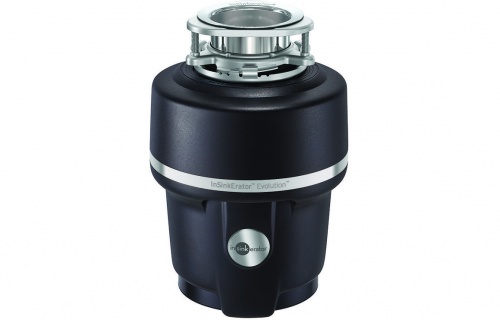Are Waste Disposal Units Environmentally Friendly?

In our ever-evolving quest to tread more lightly upon the earth, the way we manage our household waste has come sharply into focus.
Waste disposal units, a common feature in many UK kitchens, often spark debate: are they goods or bad for the environment?
This article delves into the environmental impact of these units, weighing up their benefits against potential drawbacks, and answering the pressing question: Are waste disposal units truly environmentally friendly?
Click here if you are interested in a kitchen sink waste disposal unit...
Are Waste Disposal Units Environmentally Friendly?
The modern kitchen boasts a slew of gadgets designed to make our lives easier, and among the most debated is the waste disposal unit.
Its ability to grind up food scraps and wash them away is undeniably convenient, but how does it fare from an environmental standpoint?
Firstly, let's consider the alternative: sending food waste to landfill.
In a landfill, organic matter breaks down anaerobically (without oxygen), producing methane, a greenhouse gas that is 25 times more potent than carbon dioxide over a 100-year period.
By grinding up and washing away food scraps, waste disposal units divert organic matter from landfills, potentially reducing methane emissions.
However, the equation isn't that straightforward.
Once flushed, the food particles journey to wastewater treatment plants.
While modern facilities are equipped to capture and use the methane produced during treatment, not all methane is captured, and some is released into the atmosphere.
Moreover, treating and cleaning this wastewater requires energy, which can offset some of the environmental benefits.
Another point to consider is the strain on wastewater treatment facilities.
An influx of organic matter can burden these plants, especially if they're not designed to handle high volumes.
Yet, on the positive side, the captured organic materials from wastewater can be transformed into bio-solids, which can be used as fertilisers, reducing the need for chemical alternatives.
From a water usage perspective, some argue that the water used to flush down the waste could be better utilised, especially in regions experiencing water scarcity.
However, the actual volume of water used by these units is relatively minimal in the context of total household water consumption.
So, the environmental impact of waste disposal units is complicated.
While they do reduce the amount of organic waste heading to landfills, they place additional demands on wastewater treatment plants.
The key might lie in evolving our wastewater facilities to better process and benefit from this kind of waste, thereby truly realising the potential environmental benefits of these kitchen appliances.
Like many modern conveniences, their ecological footprint depends largely on the broader systems in which they operate.
Click here to see our range of InSinkErator waste disposal units…
Some Thoughts From an Experienced Kitchen Fitter
The Undeniable Benefits of Waste Disposal Units: A Kitchen Fitter's Perspective
Having spent years as a kitchen fitter, I've seen countless kitchen designs, innovations, and upgrades.
One addition that stands out for its utility and efficiency is the waste disposal unit.
Let me share some insights into why many of my clients now consider this a must-have appliance:
- Efficiency & Convenience: Time and time again, I've witnessed homeowners sighing in relief once they've experienced the convenience of scraping leftover food straight into the sink. No more unsightly food waste sitting in your bin or the inconvenience of daily waste disposal.
- Odour Reduction: Without food scraps in the bin, kitchen odours are significantly reduced. It's a small change that makes a world of difference, especially during the warmer months.
- Hygiene & Pest Deterrence: Waste disposal units can help deter pests, such as rats, flies, and cockroaches, which are attracted to food waste. With fewer food remnants in the trash, there's less temptation for these pests.
- Plumbing Protection: Contrary to what some believe, a well-installed waste disposal unit can actually prevent drain blockages. It effectively grinds down food particles, which reduces the chance of clogs, compared to accidentally dropping larger food items down the sink.
- Environmental Benefits: Properly processed food waste through disposal units means fewer items end up in landfills, reducing greenhouse gas emissions. Moreover, modern waste treatment facilities can convert food particles from waste water into biogas, a renewable energy source.
- Space-saving and Aesthetic Appeal: A cleaner, less cluttered under-sink area enhances the overall aesthetic of the kitchen. Plus, waste disposal units are relatively compact, so they don’t rob you of much-needed storage space.
- Increased Property Value: Modern homebuyers are looking for efficiency and convenience. Having a waste disposal unit installed can be an attractive selling point, indicating the kitchen is up-to-date and well-maintained.
As a kitchen fitter, I’ve also come across concerns about the noise and potential maintenance issues related to waste disposal units.
However, with advancements in design and technology, many of the modern units are quieter and more durable than their predecessors.
And, from a fitting perspective, the integration process is relatively straightforward for seasoned professionals.
So, from both a functional and aesthetic standpoint, waste disposal units have proven their worth time and again.
They not only offer homeowners a more efficient and cleaner kitchen experience but also provide ecological benefits that are becoming ever more important in our environmentally-conscious age.
If you're contemplating a kitchen upgrade, a waste disposal unit is certainly a worthy consideration.
Some Final Notes On If Waste Disposal Units Are Environmentally Friendly
Navigating the myriad options available for modern kitchen amenities can be overwhelming.
Waste disposal units, in particular, present both a convenience for homeowners and a topic of discussion for environmentalists.
As this post has outlined, these units offer a compelling alternative to traditional waste disposal methods, potentially curbing methane emissions from landfills.
Yet, they introduce new challenges for wastewater treatment facilities.
The efficacy and environmental impact of waste disposal units are intricately tied to local infrastructures and practices.
They can indeed be a green solution when integrated into a system prepared to handle and optimise the waste they produce. As with many things in our modern age, there isn't a one-size-fits-all answer.
However, one thing is clear: as technology and infrastructure continue to evolve, so too will the debate around the best methods for waste disposal.
Stay informed, make choices tailored to your local environment, and remain open to the advancements that the future may bring.
After all, the health of our planet and the efficiency of our homes are interwoven topics, deserving of our ongoing attention and care.

